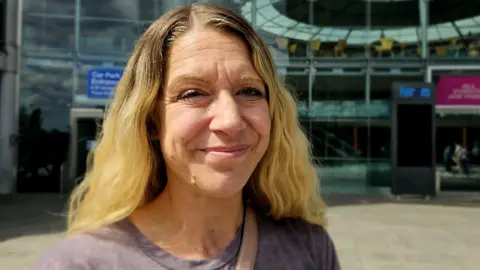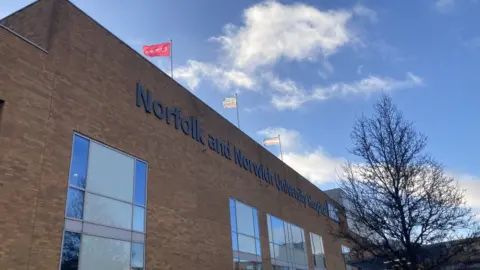Endometriosis: Norwich mum's 'disgusting' wait for surgery
 Paul Moseley/BBC
Paul Moseley/BBCA woman said it was "really disgusting" that it could be 18 months before she could have major surgery for endometriosis.
Rachel Royall, from Norwich, said the condition left her "in agony" and that only morphine eased her pain.
Waiting lists for gynaecological services have increased significantly since the Covid pandemic.
The government said tackling the waiting times backlog was "one of its top priorities".
Ms Royall, 40, said she had suffered with the symptoms of endometriosis since she was a teenager, but was only diagnosed last year.
At its worst, the condition is often debilitating for the mother of two young children.
"I'm literally in agony; I'm doubled over, I've got cramping in my stomach, my back and I'm exhausted. I can't operate," she said.

What is endometriosis?
- Endometriosis is a condition where tissue similar to the lining of the womb grows in other places, such as the ovaries and fallopian tubes
- It can affect women of any age, including teenagers
- It is a long-term condition that can have a significant impact on your life, but there are treatments that can help
- Symptoms can include pain in your lower tummy or back (pelvic pain) - usually worse during your period - period pain that stops you doing your normal activities, pain during or after sex, and difficulty getting pregnant
Source: NHS

Following a six-month wait to see a consultant at the Norfolk and Norwich University Hospital (NNUH) she was told she would require treatment, including a hysterectomy and chemically induced menopause.
However, she was told the waiting time for surgery was 12 to 18 months, which she described as "really disgusting".
Ms Royall explained she was taking morphine every day to cope with the pain, but was concerned about its long-term effects.
"The idea of having to put another strong drug into my body, that is a very addictive drug if used for a long period, is very worrying," she said.
She added that while she felt "blessed" at being able to have children, unlike many other women with endometriosis, she feared her condition was affecting her ability to be a mother.
"The fact that I didn't ever realise that I had it makes me feel totally grateful that I was able to have two beautiful children. But I feel so much guilt for not being able to do what I need to do," she said.
 Jacob Evans/BBC
Jacob Evans/BBCEmma Cox, chief executive of Endometriosis UK, said she had heard of many similar cases to Ms Royall's.
"During Covid, gynaecological waiting lists went up by a higher percentage than other medical services," she said.
"We want to see endometriosis and other menstrual health conditions given due priority based on the severity and impact they have."
Prof Nancy Fontaine, chief nurse at the NNUH, said the hospital "was very sorry to anyone waiting longer than expected for investigations and treatment".
She added: "Our teams are working hard to eliminate all 65-week waits for treatment by the end of March 2024 by carrying out additional theatre lists and clinics at evenings and weekends."
A Department of Health and Social Care spokesperson said: "Tackling the backlog caused by the pandemic, including for gynaecology services, is one of the government's top priorities and we have backed the NHS with record funding."

Follow East of England news on Facebook, Instagram and Twitter. Got a story? Email [email protected] or WhatsApp us on 0800 169 1830
